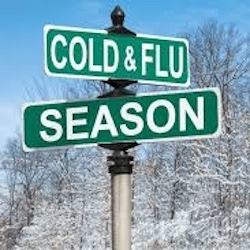Nine Tips for Surviving Cold and Flu Season
You’ve probably noticed cold and flu season is here. A lot more kids are staying home from school, more people are walking around coughing, and I’m noticing more people wearing a mask (ugh!).
Peak cold and flu activity is typically between December and February. That’s when a lot of us experience sore throat, runny nose, headache, cough, fatigue and muscle pains. Left unchecked, a flu can develop into more serious complications like pneumonia, which can be deadly.
 It’s not inevitable that you get sick during the winter. In fact, you can do a lot of things to keep yourself well when others around you are getting sick. Let’s talk about the nine most important things you can do to survive cold and flu season.
It’s not inevitable that you get sick during the winter. In fact, you can do a lot of things to keep yourself well when others around you are getting sick. Let’s talk about the nine most important things you can do to survive cold and flu season.
1. Get About 7 Hours of Sleep
A study published in the journal Sleep found that getting less than six hours of sleep greatly increased susceptibility to the common cold. Participants who slept less than 6 hours a night were 4.5 times more likely to catch a cold than those who got seven hours or more.
The study also found that getting eight hours of sleep provided no more resistance to the common cold than sleeping seven hours. So, seven hours might be enough sleep to keep a healthy immune system in check and prevent a cold.
Sleep deprivation greatly compromises your immune system. In fact, getting only four hours of sleep for just one night can cause a drop of up to 70% in your natural killer cells.
2. Stop Eating Sugar
When you consume a big dose of sugar, like a soda or a candy bar, the effect lasts for several hours. So, if you eat sweets several times a day, your immune system may always operate at a disadvantage. This belief is based on a study done in the 1970s in which subjects donated blood before and after consuming large doses of sugar. The blood was placed in a petri dish, and bacteria was introduced to both samples. Under a microscope, researchers could see that after a dose of sugar, neutrophils, your immune system’s first line of defense, were less aggressive at gobbling up bacteria. If you want a healthier immune system, limit or eliminate added sugar from your diet.
3. Eat all the Colorful, Edible Plants You Can
Fruits and vegetables are full of vitamins—especially the antioxidant vitamins A, C, and E. Your best source of these vitamins is real whole foods. Taking antioxidant vitamins has been shown to increase the risk of colon cancer and lung cancer. There is no magic pill. If you eat two to three servings of fruit and four or more servings of vegetables every day, you will get all the vitamins you need.
Variety is also important when it comes to fruits and vegetables. All fruits and vegetables contain phytochemicals, which are plant (phyto) chemical compounds that interact with compounds of other living organisms. Phytochemicals give plants their color, aroma and flavor. In humans they stimulate the immune system, slow the growth rate of cancer cells, and prevent DNA damage that can lead to cancer and other diseases. Scientists have currently identified over 5,000 different phytochemicals in fruits and vegetables, and they speculate that there are thousands more that have yet to be discovered.
4. Drink Plenty of Water
 Our Simple 9© nutritional program recommends you drink 8 to 12 cups of water a day. All the systems of your body need plenty of water to stay healthy, especially your immune system. Drinking plenty of water keeps your lymph nodes healthy by preventing dehydration, which can impair lymph drainage. Your lymphatic system is part of your first line of defense against a bacterial infection. Drinking plenty of water will keep it functioning properly.
Our Simple 9© nutritional program recommends you drink 8 to 12 cups of water a day. All the systems of your body need plenty of water to stay healthy, especially your immune system. Drinking plenty of water keeps your lymph nodes healthy by preventing dehydration, which can impair lymph drainage. Your lymphatic system is part of your first line of defense against a bacterial infection. Drinking plenty of water will keep it functioning properly.
5. Supplement with Vitamin D
Vitamin D is critical for a healthy immune system. It regulates several key genes involved in immune system modulation. It influences the production and expression of literally every type of immune cell in your innate and adaptive immune system. It also plays a huge role in regulating inflammation.
Most of us don’t get enough Vitamin D, with 70% of adults in the US having insufficient Vitamin D levels. The sun is our best source of Vitamin D, but from October to April, most mid-westerners don’t get much sun. We also don’t get a lot of Vitamin D from the foods we eat. Supplementing with 2,000 to 4,000 IU of Vitamin D daily is one of the best things you can do to keep your immune system strong during the winter months.
Carlson is my favorite Vitamin D brand. I typically take 2000 IU every day from October to April.
6. Get Plenty of Echinacea
Those beautiful pink cone flowers that we see everywhere in late summer are actually a powerful herb that has been used for hundreds of years to treat numerous illnesses, including cough and sore throat. A meta-analysis of fourteen studies that included 1,630 participants found that echinacea reduced the chances of getting a cold by 58%.
A six month supply of echinacea costs about $14.00. It’s a very inexpensive form of cold prevention. I can honestly say from personal experience it’s been one of the things that’s kept me well over the past several years.
7. Reduce Stress by Having Fun
Stressful events can significantly reduce your immune system for a day or so, but pleasant events can boost your immune system for a couple of days. Dr. Arthur Stone, a psychologist at the medical school of the State University of New York at Stony Brook, tracked the effects of daily activities of 100 men for three months. He found that stresses like being criticized at work weakened immune function on the day they occurred. But events like a pleasant family celebration or having friends over enhanced the immune system for the next two days.
 Especially during the winter months, it’s important to be very intentional about having fun to reduce stress and depression. Plan game nights with family and friends. Watch comedies instead of dramas. And spend as much time as you can with friends who make you laugh.
Especially during the winter months, it’s important to be very intentional about having fun to reduce stress and depression. Plan game nights with family and friends. Watch comedies instead of dramas. And spend as much time as you can with friends who make you laugh.
8. Get a Dose of Nature
Most of us don’t spend enough time outdoors in the winter months. Let’s face it, it’s cold and dark. But getting outside in the winter is extremely beneficial to your health. A study at the University of Michigan found that getting outside in nature for 20 minutes, three times a week will significantly reduce stress hormone levels.
Also, spending time outside in the cold weather improves your immune system.
9. Strength Train
Strength training makes everything in your body stronger, including your immune system. A metanalysis on the effects of strength training on the inflammatory response found that strength training is effective at reducing systemic inflammation. And we know that too much inflammation makes us sick. The study found that it’s important to train hard, then give your body plenty of time to rest, which is what we do at Exercise Inc.
Hopefully some (or all) of these tips will keep you strong and healthy during the fall and winter months. Remember, if you need help with exercise or nutrition, we are here for you. If you’re not a client and you want to be stronger and healthier, contact us today for a free consultation.
Stay Strong and healthy.
Bo Railey

